Choose your Preferred Study techniques:
Follow Easy and effective Study techniques. They are good motivators for you to study. A repetitive way of studying could bore you easily and lose concentration. Instead, if you follow interesting study techniques you will be encouraged now and the next time too.
Good Study techniques would be:
- Visualizing.
- Drawing flow charts to understand the concept flow in the subject.
- Taking hints.
- Using mnemonics.
- Picking one thing first to focus and study instead of gathering everything.
- Using acronyms.
- Mind mapping.
- Using sticky notes. Write core concepts, formulas, principles, etc. and stick them wherever you need. The next time, just by looking at the sticky note you should understand what they have explained on that page or the whole chapter easily.
- Taking notes your way.
- Refer to good case studies, live examples, previous research works. It helps you visualize and understand the topics, concepts, and theories.
- Doing Q&A sessions.
- Read aloud. By simply reading to yourself, you can feel drowsy at times.
- Use pictorial/diagram representations your way to understanding the theory.
- Take a break if you feel lazy, drowsy or feel like stopping. You will lose focus if you continue. It’s okay to take a quick break now and then.
- Listen to some music.
Pick the study technique that is easy for you. It persuades you to study.
Learn effective strategies for prioritizing your studies. Enhance your productivity and focus on tasks that matter most for academic success.
Have Priorities & Don’t Multitask your Studies:
When it comes to studying, have priorities and not multitasks. When you multitask, especially with your studies, you tend to lose focus easily. You get confused about what to choose right now and what can wait. Prioritize your study. Make an agenda and see what to study first.
How to prioritize your Studies?
1. Break your studies into a list. The numbered list will give an idea about what are all the things you have to complete. It helps you focus.
2. See what tasks are urgent or have short deadlines. Take your assignments or reports for example. They will have a deadline. You should give priority first here. Studying for it could be important right now.
3. If you have any large projects, like for instance: Take Thesis Writing. it will take more time and a lot of study hours.
1.) Break them down into subparts.
2.) Number them based on what to take care of first or what to write first.
3.) Divide them based on ‘finding resources’ for it. Resources could be books, old references, previous thesis, sample research works, lectures, etc. By listing them down, you can prioritize as well as see what you need first to start studying. I find this tip useful because by listing my needed resources I know what to do first. I start by collecting previous research papers first for my studies and writing.
4. Always, prioritize your studies based on ‘Time it Takes’, ‘Difficulty Level’ and ‘Duration you will need’.
Depending upon your studies or subjects you can make your priorities. You can identify what to do first and where to being regarding your study. Having a little priority list motivates you to study.

Anxiety is also associated with high levels of worry that can affect academic performance. Researchers tested the relationship between anxiety, academic performance, and working memory. As students' levels of anxiety, depression, and worry increased, academic performance decreased.
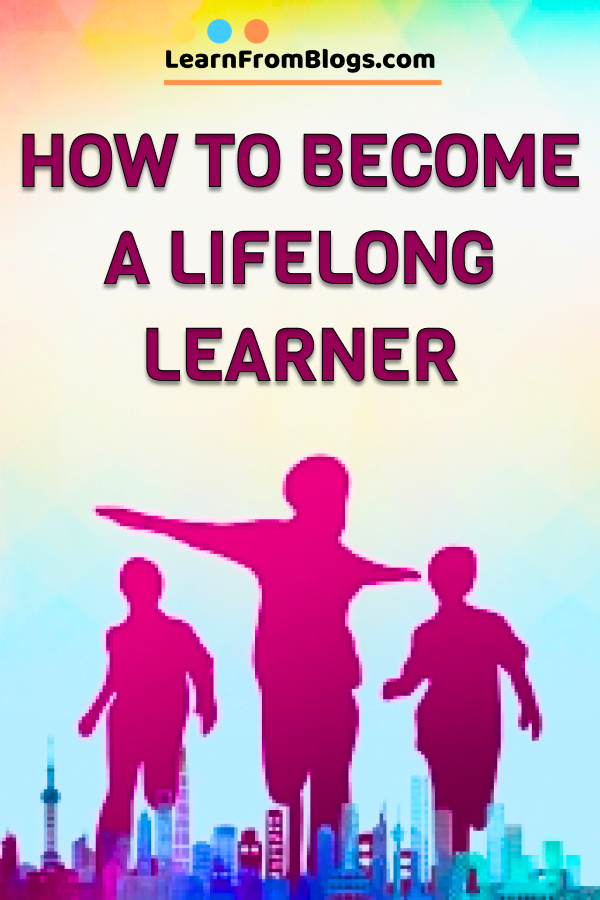
Education has a great impact on our life and in our success. Hence I listed below some tips on how to become a lifelong learner.
1. ATTITUDE
Let's begin by having a heart that desires wisdom and change. Then apply this desire into action.
2. BE INQUISITIVE
Possess an insatiable curiosity. Lifelong learner likes to learn more so the "why's" are never-ending.
3. ASSOCIATE.
People are a goldmine of information so befriend other people and join collaborative learning with them.
4. BE RESPONSIVE
Listening and responding always go hand-in-hand. Take time to examine and understand another point of view to see things lightly.
5. BE BOOKISH
Read broadly from newspaper to your mom's recipe. Just read anything you see, even it doesn't interest you.
6. KEEP A JOURNAL.
A journal is something you want to keep your secrets. And that secret is success and wisdom. Record every important detail in your life.
7. BE INNOVATIVE
Try to experiment on things. It is okay if you commit mistakes at first but do better next time until you made it perfectly.
8. LASTLY, APPLY WHAT YOU KNOW.

1.) Do 5 minutes of revision every day
2.) Read through a page of class notes at the end of each day
3.) Write down your homework at the end of each lesson
4.) Self-monitor your learning
5.) File notes in the right place every day
6.) Read one online article to supplement your classroom learning every day
7.) Review your day
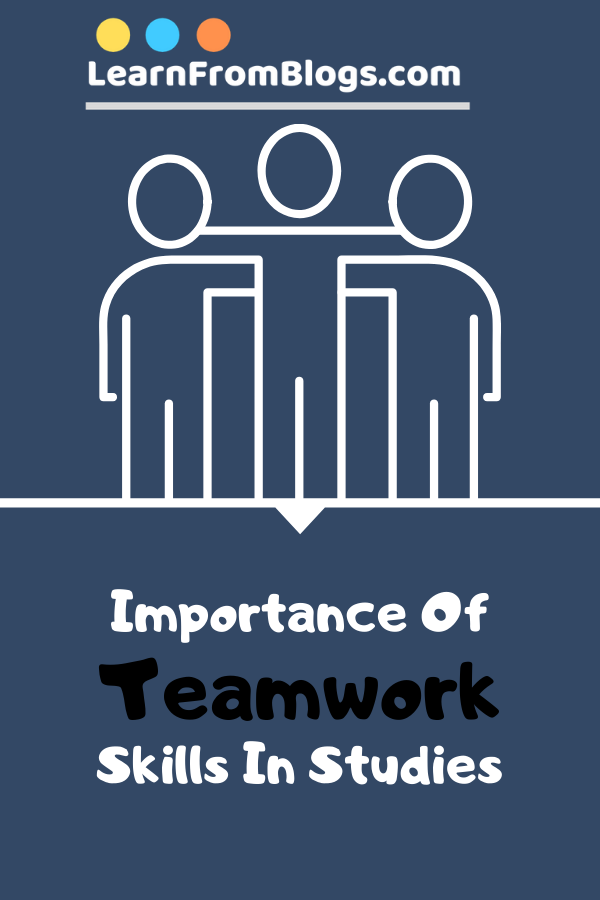
I) More collaboration
Engaging in team discussions contributes to the development of students' social skills. Within this collaborative setting, students actively listen to each other, fostering an environment where ideas and thoughts are shared openly.
The exchange of notes and materials among team members serves to enhance speaking, reading, and writing skills.
Additionally, participating in team discussions instills values such as hard work and dedication among students.
II) Enthusiastic environment
Fostering teamwork within study groups provides a platform for lethargic and inactive students to actively participate and express their thoughts openly.
To further engage students in discussions, incentives such as rewards or gifts can be introduced.
Additionally, providing tools like study planners, colorful cards, charts, and other resources serves as a means to motivate and encourage student involvement in the collaborative learning process.
III) Personality development
Encouraging students to express their opinions and views within the group, including with both fellow members and leaders, facilitates a more open mindset towards the world.
Beyond that, the cultivation of teamwork skills contributes significantly to the enhancement of self-esteem and confidence for each student.
IV) Group learning
Facilitating team discussions serves as a catalyst for fostering creative thinking among students, enabling them to swiftly solve problems.
Additionally, participating in such collaborative endeavors enhances students' logical and reasoning skills.
The process of creating study lists and schedules empowers students to generate valuable ideas, opinions, and perspectives, contributing to their overall academic growth.
1.) Make notes in your own flavor. Paint it with your own color.
2.) Don’t be afraid of failure. Failure is a part of learning. See new things, explore more, and stick to one thing unless it is done.
3.) Try to find more ideas for learning the same things.
4.) Practice is the key; never give up.
5.) Make new friends share your learning experiences and take good advice.
6.) Do what you love, and love what you do.
7.) Remember what you get on the other side of the learning wall.
8.) Sit down and refresh your plans.
9.) Learning new things is not as easy and cool as it seems to be. But if you have strong willpower to learn new things, it is not rocket science as well.
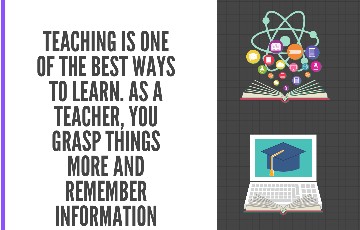
We mainly use three main learning techniques: Reading, listening and watching.
One of the key challenges that learners face is how to study fast in less time. For this purpose, we need to understand how our brain works. Our brain can grasp more by images, videos, and graphics. The digital convergence will help you in learning with interactive graphics and videos. You can play many mind games and puzzles online. You can precisely stimulate things with 3-D maps and graphics. This will help you study fast and effectively.
Teaching is one of the best ways to learn. As a teacher, you grasp things more and remember information related to that skill. You can actually learn while you are preparing to teach someone else. You can create your YouTube channel and show your hidden talent there.
You can add subscribers from your social networks. Everyone wants to learn new things in an interesting manner. You should reserve the most active time of your day for learning. Upload your own teaching videos, it will eventually help you. You can teach anything and everything you know.
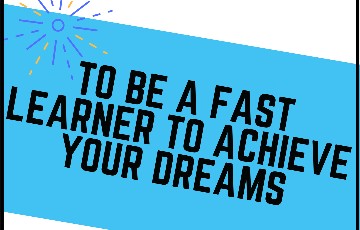
Try to follow the latest updates and learn the skills of high values. Read books; they are the best teachers of our lives. The more you read, the more things you will know.
The more you know, the more you will grow. Being more productive is the demand in today’s competitive world. You have to be a fast learner in order to achieve your dreams.
The first thing that you have to do is finding the skills related to your career objective. You can allot your free time to learn a new skill every day. There is a long list of new skills, the latest technologies, and new vocational courses. You can select more than one at a time so that you can have a choice. Follow your passion, whatever it is. Be what you want to be in life. Learn new things and take an edge over others.
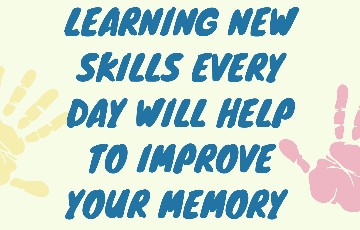
Learning new skills every day will help to improve your memory. You can absorb information and try to retain the information for a long term. This will help your day-to-day life. You will gradually turn into a fast learner.
Learn new languages; coding, technologies, life skills, art, or some new dance form. That would simply be a bang-up job. You can add more key points to your resume. You can describe yourself as a fast learner with an example. You can get an important job with the help of the great skill set you’ve built.
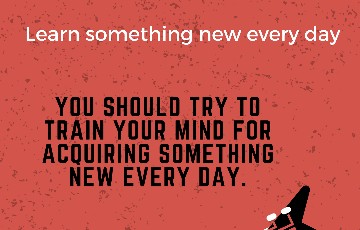
You should try to train your mind for acquiring something new every day. If we follow the same schedule daily, our mind will feel dormant. Our brain also requires some workout like our muscles. We can’t ignore the most essential part of our body.
A new day starts with new energy. Take out time to learn new skills, new languages, new art form, new song, new technologies. It will also take your self-esteem and your confidence to cloud nine. You can make new relations; get new appraisals in your study and career. Remember the sky is the limit. To shine, you have to burn first.
Learning new things will kill your stress and anxiety. It will make you happy. The more you learn, the more you grow. In this time of globalization, good communication is the key to success. If you know more about new skills, languages, and things around you; you can communicate well with others.
You should select things to learn relevant to your main course of study or to your career objective. You should learn creative things in order to enhance your analytical skills.
Love the process of learning: Ask yourself a simple question, "Why I am learning this"? What is in it for me? The questions are simple but they can open a world of endless opportunities in front of you. Once you know the answer, you are going to love the learning process.
Learn to relax your body for learning better: It is a proved fact that in tension the information slips your mind. When your mind is relaxed the same information is magnetically attracted. Give your mind an instant break whenever you feel stressed and try to seek pleasure for it in one way or the other.
Make a study plan for the entire year: Remember, maps are not the territory you seek, but these surely help to reach the territory. Actually, they are highly required. Make maps in your mind with all the information you have. This helps to remember/retrieve any information in a matter of seconds.
Inspect the concept well: Ask yourself some question related to what you are learning. This will help you to know what you know and what you don't know. This helps to get a clear picture of what more you need to learn more about something.
1. Use different modes of learning: Science says that different parts of the brain are stimulated by different types of media. So to activate different areas of the brain, it is better to use different modes of learning including audio, visual or audio-visual, etc.
2. Study multiple subjects each day: Does your mind ask a question that how can I learn anything quickly? How do you learn your subjects? Do you study only one subject each day? Actually, if you study only one subject for a longer time, the probability is that you may confuse similar information. So it is better to read any subject in a day, than one subject a day.
3. Revise the information periodically: This practice is necessary to be followed if you want to transfer the same amount of information from short-term memory to long-term memory. Revise periodically.
4. Try to sit in the front of the class: Those who sit at the front are able to see the board more clearly and listen to the teacher more clearly. Front benchers have to be sincere as the teachers are always nearby. This indirectly increases the concentration.
1.) Always write your notes with pen and paper as it speeds up the process of learning and helps to retain the information for long.
2.) Develop the essential skills required for effective notes taking. Notes taking is an art, which if practiced properly can help to get the best notes in the shortest form that ultimately helps to get success in exams.
3.) Use some mnemonic devices: Mnemonic devices are just the patterns of sounds, ideas, letters, etc. that helps to associate some idea with that of the other to retain the information for long.
4.) Go for distributed learning instead of whole learning together. Study in blocks of time. This is how to study fast and effectively.
5.) Change your method of learning to suit the changing needs. Learning of English demands a different approach, while the study of Math demands differently. Similarly, one concept of English wants you to learn it in a different way than that of the other. So change your methods of learning. Try to find methods which ease the process of learning for you.
6.) Take a nap or small breaks in between the blocks of study.
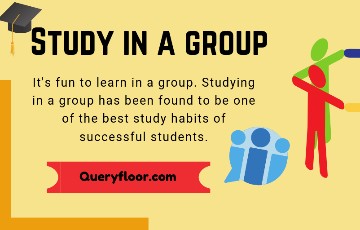
Students, who are more of an introvert feel uncomfortable in a group, as they tend to speak less and found themselves neglected. Some parents of such students always instruct them to stay home and study at their leisure, and some others pressurize them to study in groups so that they may open up and speak. Both the ways are actually wrong as per my opinion.
Do not pressurize a student for something which is opposite to their basic nature. But always motivate them to study in a group, highlighting the benefits of it. Even if someone does not talk or open or share their learning in the group, at least they can listen to the talks of other persons in their group.
Who knows they may end up getting new insight on the topic or field of study! It's fun to learn in a group. Studying in a group has been found to be one of the best study habits of successful students. What do you think?
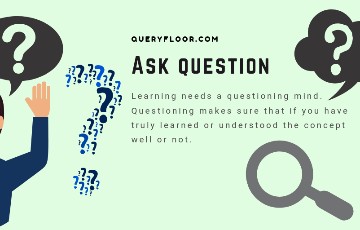
Some students hesitate to ask a question. The reason may be varied, it may be that they fear that their companions might mock at them for asking such a silly question, or that the teacher might consider him/her dumb to ask a silly question, or for the simple reason of not disturbing the class.
Whatever might be the reason, remember one thing that you are in the school/college to learn and learning needs a questioning mind. If questions frequently come to the mind of a student, it is a good symbol indicating the active engagement of the students' mind in the learning process.
Questioning makes sure that if you have truly learned or understood the concept well or not. This is a study tips for success which is given by most of the successful tutors from around the world.
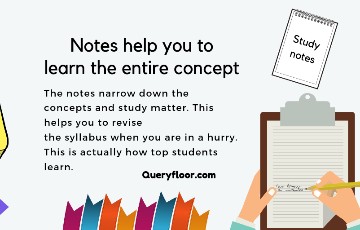
For some, taking notes is just a way to keep themselves engaged in the class, or to show to their teachers how attentively they are listening.
Some students even throw out the notes after the class with overconfidence that they have learned the concept well and they will not need them anymore. But do you know, when exam times roll out, these notes help you to learn the entire concept in no time?
Actually, the notes narrow down the concepts and study matter. This helps you to revise the content when you are in a hurry. This is actually how top students learn.

- Create a mindset that you should listen and not be distracted.
- Sit in of the rows in the front side of your class.
- Use a stress ball or fidget spinner to remove stress.
- Participate in class sessions.
- Avoid all distractions during class such as social media.


